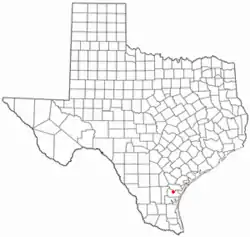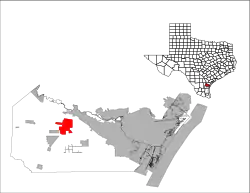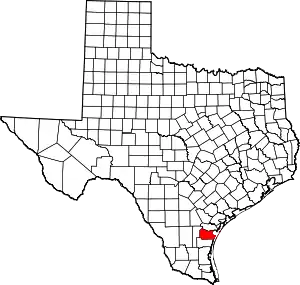Robstown, Texas
Robstown is a city in Nueces County, Texas, United States, and a western suburb of Corpus Christi. It was founded about 1906, and was named for Robert Driscoll.[5] The population was 11,487 as of the 2010 census.
City of Robstown | |
|---|---|
| Nickname(s): Pickerland, Robé | |
 Location in the state of Texas | |
 | |
| Coordinates: 27°47′33″N 97°40′10″W | |
| Country | United States |
| State | Texas |
| County | Nueces |
| Area | |
| • Total | 12.99 sq mi (33.63 km2) |
| • Land | 12.99 sq mi (33.63 km2) |
| • Water | 0.00 sq mi (0.00 km2) |
| Elevation | 72 ft (22 m) |
| Population (2010) | |
| • Total | 11,487 |
| • Estimate (2019)[2] | 11,261 |
| • Density | 867.16/sq mi (334.80/km2) |
| Time zone | UTC−6 (CST) |
| • Summer (DST) | UTC−5 (CDT) |
| ZIP code | 78380 |
| Area code | 361 |
| FIPS code | 48-62600[3] |
| GNIS feature ID | 1345344[4] |
| Website | www |
The Texas State Legislature officially recognizes Robstown as the birthplace of Texas hold 'em poker.[6]
Geography
Robstown is located at 27°47′33″N 97°40′10″W (27.792615, –97.669386).[7]
According to the United States Census Bureau, the city has a total area of 12.1 square miles (31 km2), all of it land.
Climate
The climate in Robstown is characterized by hot, humid summers and generally mild to cool winters. According to the Köppen climate classification system, Robstown has a humid subtropical climate, Cfa on climate maps.[8]
Demographics
| Census | Pop. | Note | %± |
|---|---|---|---|
| 1920 | 948 | — | |
| 1930 | 4,183 | 341.2% | |
| 1940 | 6,780 | 62.1% | |
| 1950 | 7,278 | 7.3% | |
| 1960 | 10,266 | 41.1% | |
| 1970 | 11,217 | 9.3% | |
| 1980 | 12,100 | 7.9% | |
| 1990 | 12,849 | 6.2% | |
| 2000 | 12,727 | −0.9% | |
| 2010 | 11,487 | −9.7% | |
| 2019 (est.) | 11,261 | [2] | −2.0% |
| U.S. Decennial Census[9] | |||
2020 census
| Race | Number | Percentage |
|---|---|---|
| White (NH) | 562 | 5.54% |
| Black or African American (NH) | 114 | 1.12% |
| Native American or Alaska Native (NH) | 8 | 0.08% |
| Asian (NH) | 17 | 0.17% |
| Pacific Islander (NH) | 5 | 0.05% |
| Some Other Race (NH) | 25 | 0.25% |
| Mixed/Multi-Racial (NH) | 39 | 0.38% |
| Hispanic or Latino | 9,373 | 92.41% |
| Total | 10,143 |
As of the 2020 United States census, there were 10,143 people, 4,137 households, and 2,731 families residing in the city.
2019
As of 2019, the Census Bureau estimates[13] the population to be 11,261 people and consisting of 3,728 households. Owner-occupied housing is 58.1%. The average household has 3.06 persons. The racial makeup of the city was 5.6% White, 0.2% Native American, 0.1% Asian, and 0.9% from two or more races. Hispanics or Latinos of any race were 93.8% of the population. Non-Hispanic Whites were 5.8% of the population. Median value of housing was $52,900. Median gross rent was $688 per month.
In the city, the age distribution of the population was 9.2% under the age of 5, 31.0% under the age of 18, and 17.1% who were 65 or older. Females were 51.1% of the population. Foreign-born persons were 5.3% of the population.
Population density was 741.0 persons/sq mi. Land area is 15.50 sq mi. The FIPS code is 4862600
The median income for a household in the city was $29,218. Per capita income was $14,178. The poverty rate was 41.1%.
Point of interest
The Robstown post office contains a mural, Founding and Subsequent Development of Robstown, Texas, painted in 1941 by Alice Reynolds.[14] Federally commissioned murals were produced from 1934 to 1943 in the United States through the Section of Painting and Sculpture, later called the Section of Fine Arts, of the Treasury Department.[15]
Neighborhoods
Robstown is divided into several distinct neighborhoods. The Ashburn, Kissling area is located just east of Bluebonnet, next to the Robstown Early College High School. The area locally known as Bluebonnet is located in the northwest area of town, right next to Robstown Early College High School. The area locally known as Casa Blanca has a school. San Pedro is on the westside, next to San Pedro Elementary School.
Education
The City of Robstown is served by the Robstown Independent School District. The Robstown Early College High School's early college program is also assisted by Del Mar College, Coastal Bend College, and the University of Texas.
Media
- Robstown Record (1926-1977)[16]
- Nueces County Record Star,[17] weekly, owned by GateHouse Media
Notable people
- Damian Chapa, starred in the famous Mexican American film Blood In, Blood Out
- Eddie Jackson, is the bassist for Seattle progressive metal band Queensrÿche
- Brooks Kieschnick, a former MLB player for the Chicago Cubs, Cincinnati Reds, Colorado Rockies, and Milwaukee Brewers, was inducted into the College Baseball Hall of Fame[18]
- Solomon P. Ortiz, former U.S. Representative for Texas's 27th congressional district[19]
- Gene Upshaw, a former NFL player for the Oakland Raiders, was inducted into the Pro Football Hall of Fame[20]
- Marvin Upshaw, was a player for the Cleveland Browns, Kansas City Chiefs, and St. Louis Cardinals[21]
References
- "2019 U.S. Gazetteer Files". United States Census Bureau. Retrieved August 7, 2020.
- "Population and Housing Unit Estimates". United States Census Bureau. May 24, 2020. Retrieved May 27, 2020.
- "U.S. Census website". United States Census Bureau. Retrieved January 31, 2008.
- "US Board on Geographic Names". United States Geological Survey. October 25, 2007. Retrieved January 31, 2008.
- "Profile for Robstown, Texas". ePodunk. Retrieved June 20, 2010.
- "Recognizing Robstown, Texas, as the birthplace of the poker game Texas Hold'em". House Concurrent Resolution No. 109 of June 15, 2007. Texas House of Representatives.
- "US Gazetteer files: 2010, 2000, and 1990". United States Census Bureau. February 12, 2011. Retrieved April 23, 2011.
- Climate Summary for Robstown, Texas
- "Census of Population and Housing". Census.gov. Retrieved June 4, 2015.
- "Explore Census Data". data.census.gov. Retrieved May 21, 2022.
- "Census.gov". Census.gov. Retrieved July 20, 2022.
- "About the Hispanic Population and its Origin". www.census.gov. Retrieved May 18, 2022.
- "U.S. Census Bureau QuickFacts: Robstown city, Texas". Census.gov. Retrieved July 20, 2022.
- "Robstown, Texas Post Office Mural". Texasescapes.com. June 24, 2009. Retrieved July 20, 2022.
- Arnesen, Eric (2007). Encyclopedia of U.S. Labor and Working-Class History. Vol. 1. New York: Routledge. p. 1540. ISBN 9780415968263.
- "Robstown Record". NewspaperArchive. Retrieved March 24, 2023.
- "Nueces County Record Star". Nueces County Record Star. Retrieved May 6, 2018.
- "Brooks Kieschnick Stats | Baseball-Reference.com". Baseball-Reference.com. Retrieved February 3, 2018.
- "ORTIZ, Solomon P., (1937–)". Biographical Directory of the United States Congress. Retrieved December 10, 2012.
- "Gene Upshaw". daabaseFootball.com. Archived from the original on April 8, 2013. Retrieved December 10, 2012.
- "Marv Upshaw". databaseFootball.com. Archived from the original on January 21, 2013. Retrieved December 10, 2012.
External links
- Robstown, Texas from the Handbook of Texas Online
